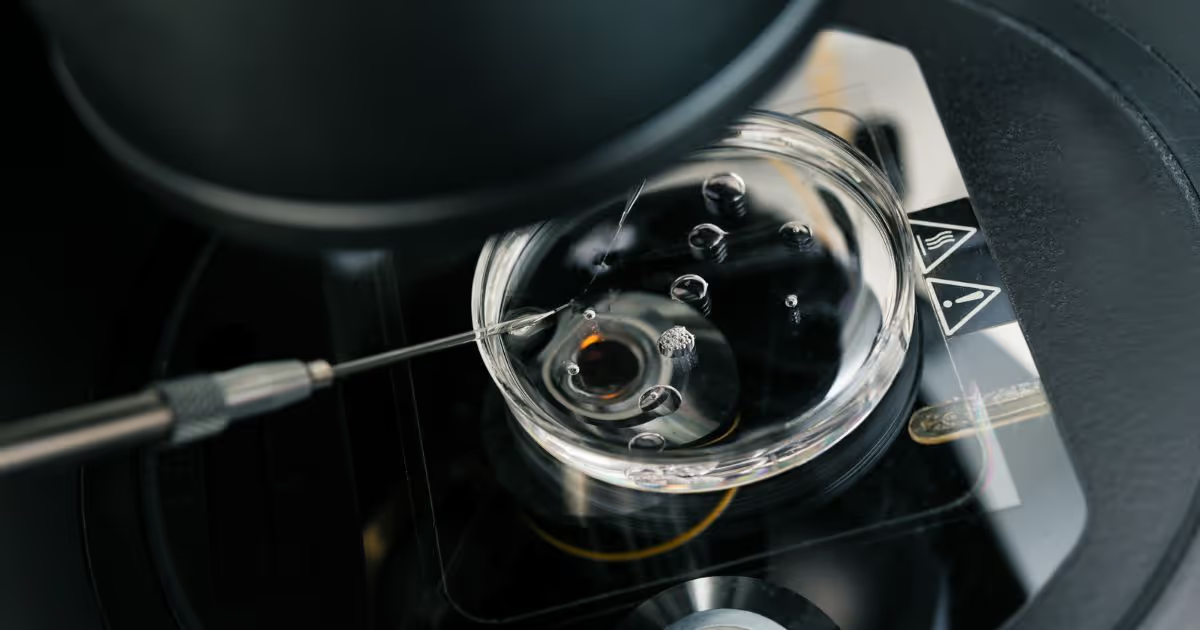What is IVF (In Vitro Fertilization)?
In vitro fertilization (IVF) is an assisted reproductive technology (ART) in which sperm and eggs are extracted for fertilization in a laboratory, followed by embryo implantation for pregnancy. It is one of the most effective ART options for people with infertility who have problems such as:
- Low sperm count or quality
- Blocked or damaged fallopian tubes
- Endometriosis
- Polycystic ovary syndrome (PCOS)
- Uterine fibroids
- Risk of a genetic disease or disorder
Steps of IVF Treatment
IVF is a complex process that takes approximately 4-6 weeks, starting from self-preparation and egg retrieval to pregnancy. Around 5% of infertile couples have tried IVF. Since 1978, more than 8 million babies have been born with IVF.
Before the IVF Treatment
You will start with having a consultation with an IVF specialist, a thorough medical exam, and the following infertility investigations depending on the doctor’s discretion based on the medical history of each couple.
- Pelvic exam, Pap smear, and mammogram (if you are over 40).
- Semen analysis
- Sexually transmitted diseases and other infectious disease screening.
- Blood and urine tests
- Genetic carrier screening
- Hysteroscopy or saline-infused sonography (SIS)
You will sign informed consent forms, start taking folic acids, and learn how to inject hormonal medications.
During the IVF Treatment
- Ovarian Stimulating and Monitoring
The doctor will prescribe parenteral hormones such as follicle-stimulating hormone (FSH) to stimulate simultaneous egg maturation. So, you will have many eggs ready for retrieval in the same session. The type, dosage, and frequency of injectable hormones depend on your age, medical history, AMH (anti-mullerian hormone) level, and response to ovarian stimulation.
The doctor will repeat ultrasounds to check the uterus and ovaries, measure the follicle sizes, and obtain blood hormone level tests every couple of days over the first two weeks. Follicles larger than 14 millimeters usually contain mature eggs. Finally, the doctor will inject an egg maturation hormone around 36 hours before egg retrieval.
During the ovarian stimulation, you may have hot flashes, headaches, nausea, vomiting, abdominal pain, enlarged ovaries, and bruises from the injections. - Egg retrieval
The doctor will administer mild sedation medication to lessen the discomfort during the procedure. Through the vagina, a thin needle is directed to the ovaries under an ultrasound guide to retrieve mature eggs from each follicle. The eggs will be placed in a lab dish containing a specialized solution and kept in an environmentally controlled incubator. - Fertilization
An embryologist will perform the intracytoplasmic sperm injection (ICSI). Usually, 70% of mature eggs will fertilize. If there are a lot of mature eggs and you do not want to fertilize all, you can cryopreserve the excess embryos for future use. - Embryo Development
The embryologist will monitor the development of embryos. Around 50% of fertilized embryos will successfully become blastocysts.
If there are many embryos, your doctor may suggest embryo cryopreservation to freeze and store them for future use. However, not all of them survive the freezing and thawing process. - Embryo Transfer
Before the embryo transfer, you will have to take oral hormones for 14-21 days to prepare the uterus for embryo implantation. The hormones estrogen and progesterone can help thicken the uterine lining and increase the chances of successful embryo implantation and pregnancy. Usually, you will have to take the hormones through the first trimester.
The embryo transfer procedure is like a pelvic exam and takes around 30 minutes, requiring no anesthesia. A uterine transfer of the embryo occurs using a catheter.
There are 2 types of embryo transfer.
- Fresh Embryo Transfer
3-7 days after egg retrieval, the doctor will place fresh embryos into the uterine cavity. - Frozen Embryo Transfer
An embryologist will thaw the frozen embryos from a previous IVF cycle for the doctor to insert them into the uterus; this method is more popular with a higher live birth rate. Frozen embryo transfer can occur years after egg retrieval and fertilization.
If you have repeatedly failed IVF cycles, your doctor may use assisted hatching technology to create a small hole in the membrane surrounding the embryos before transferring them into your uterus. This procedure helps improve the chance of successful embryo implantation.
After the IVF Treatment
After you complete an embryo transfer, you can return to your daily activities. You may experience discomforts, such as vaginal spotting, mild cramping, bloating, breast tenderness, and constipation. Around two weeks after the embryo transfer, you will have a blood test for pregnancy.
Risks of IVF Treatment
With IVF treatment, there can be risks as follows:
- Complications during egg retrieval, such as infection, bleeding, and damage to reproductive organs, bowel, and bladder
- Ectopic pregnancy
- Multiple births
- Premature births
- Ovarian hyperstimulation syndrome (OHSS)
- Birth disorders may be slightly higher due to delayed pregnancy or preexisting underlying causes of infertility
An IVF pregnancy is not high-risk unless parents have preexisting medical conditions such as high blood pressure or advanced maternal age.
IVF treatments may fail at any step due to several reasons.
- Premature ovulation
- No retrievable eggs
- No maturable eggs
- No fertilization
- Quality of sperm
- Embryo developmental arrest
- Embryo implantation failure
- Egg retrieval or embryo transfer problems
Factors that can help with the success of IVF are your age, height, weight, health condition, underlying causes of infertility, the number of IVF cycles, etc. Your doctor will assess your overall medical condition, weigh the treatment processes, and plan an appropriate approach to increase the pregnancy’s success. If an IVF treatment fails, you should wait 4-6 weeks to rest physically and recover psychologically before trying again.
IVF can be physically taxing and emotionally draining. Struggling to achieve pregnancy can overwhelm you, causing worries and depression. Always discuss your mind with your doctor to jointly find a suitable solution.
Success Rate of IVF Treatments
The mother's age is the overriding determinant for a successful pregnancy and live birth from IVF treatment.
- Mothers younger than 35 have a success rate of 46.7%.
- Mothers aged 35 to 37 have a success rate of 34.2%.
- Mothers aged 38 to 40 have a success rate of 21.6%.
- Mothers aged 41 to 42 have a success rate of 10.6%.
- Mothers aged 43 and up have a success rate of 3.2%.
When to see the doctor
Seek medical care if, during the IVF treatments, you experience
- Heavy vaginal bleeding
- Blood in urine
- Fever higher than 38.5 degrees Celsius
- Pelvic pain
- Abnormal vaginal discharge.
Turn your dreams into reality. Let's talk about your family's success story!














